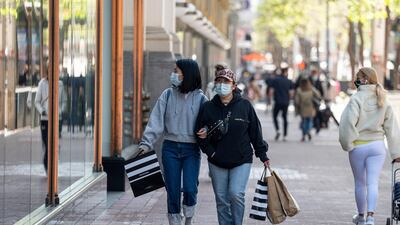US retail sales rose by the most in 10 months in March as Americans received additional pandemic relief checks from the government and increased Covid-19 vaccinations allowed broader economic re-engagement, cementing expectations for robust growth in the first quarter.
The brightening economic prospects were underscored by other data on Thursday showing first-time claims for unemployment benefits tumbled last week to the lowest level since March 2020, when mandatory closures of non-essential businesses were enforced to slow the spread of the first Covid-19 wave.
Though output at factories rebounded modestly last month amid a global semi-conductor chip shortage that is hurting car plants, manufacturing remains underpinned by the strong domestic demand.
The upbeat data, which followed on the heels of recent reports showing inflation heating up, will likely not shift the Federal Reserve's ultra-easy monetary policy stance.
"Demand is booming right now. Fed officials up to now have said they expect this boost in demand to be fleeting and will not consider changes in policy until the labour market is at full employment and price levels increase at a sustained pace," said Chris Low, chief economist at FHN Financial in New York. "Their resolve will be tested in the next couple of months."
Retail sales rebounded 9.8 per cent last month, the largest increase since May 2020, the Commerce Department said. Data for February was revised higher to show sales dropping 2.7 per cent instead of 3.0 per cent as previously reported. March's rise pushed the level of sales 17.1 per cent above its pre-pandemic level to a record high.
Economists polled by Reuters had forecast retail sales would increase 5.9 per cent in March. Retail sales surged a record 27.7 per cent on a year-on-year basis.
The broad-based rebound was led by motor vehicles, with receipts at car dealerships accelerating 15.1 per cent. Sales at clothing stores soared 18.3 per cent.
Consumers also boosted spending at restaurants and bars, leading to a 13.4 per cent jump in receipts. Still, sales at restaurants and bars are 1.8 per cent lower compared to March 2020.
Receipts at electronics and appliance stores increased 10.5 per cent and sales at furniture stores rose 5.9 per cent. There were also hefty gains in sales at sporting goods, hobby, musical instrument and book stores. Sales at building material stores vaulted 12.1 per cent. Online retail sales increased 6.0 per cent.
Many qualified households have received additional $1,400 cheques which were part of the stimulus package approved in early March. The package also extended a government-funded $300 weekly unemployment supplement through September 6.
Households have amassed about $1.9 trillion in excess savings. That, together with a recovering labour market, are expected to underpin consumer spending this year.
In a fifth report on Thursday, the Labour Department said initial claims for state unemployment benefits decreased 193,000 to a seasonally adjusted 576,000 for the week ending April 10, the lowest level since mid-March 2020. Economists had forecast 700,000 applications for the latest week.
Despite the big drop, claims remain well above their pre-pandemic level. Part of the elevation in claims is because of fraud. The enhancement of the unemployment benefit programmes, including the weekly subsidy, could also be encouraging some people to file for aid and others not to seek work.
Claims have dropped from a record 6.149 million in early April 2020. In a healthy labour market, claims are normally in a range of 200,000 to 250,000.
"Although one cannot read too much into any one week's reading on jobless claims, the degree of the drop in initial filings hints at a strong labour market in early April as Covid-related restrictions in various states were eased," said Conrad DeQuadros, senior economic adviser at Brean Capital in New York.
The economy created 916,000 jobs in March, the most in seven months. Employment remains 8.4 million jobs below its peak in February 2020.
At the same time, temperatures have warmed up and the public health situation has been rapidly improving, allowing more restaurants to offer dining services.
The data, together with upbeat earnings reports from several companies, propelled the S&P 500 index and the Dow Jones Industrial Average to record highs. The dollar was steady against a basket of currencies, while US Treasury prices were higher.

